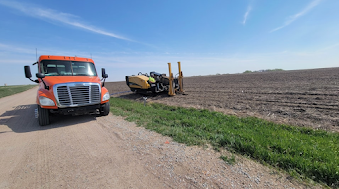 |
| Broadband is reaching some rural residents while others feel 'cut off.' (Photo by Emily Haxby via Modern Farmer) |
It's widely known that getting broadband to "the last mile" is a challenge, but there are other dead spaces. The Stroup family farm raises beef cattle and grows soybeans and wheat near Bessemer City, NC., pop. 5,400. "The family has been consistently stymied when it comes to internet access on their farm," Cadloff writes. "The farm is a classic example of those impacted by the middle mile effect. In an urban area, if an internet service provider lays a mile of cable for broadband internet, it will be able to connect hundreds, if not thousands, of customers because the area is densely populated. In a rural area, that same mile of cable might connect a single family, so ISPs aren't financially incentivized to run cable in those regions. What ends up happening is a lot of high-volume areas, surrounded by dead zones."
Dead zones disproportionately limit rural connections from online schooling to a farmer's ability to update his tractor's technology software, but the solution has been hard to come by. Sascha Meinrath, the Palmer Chair in telecommunications at Penn State University, told Cadloff: "The Farm Bill could include a mandate that says anytime a provider reports to a federal agency that they provide service at an address, they must provide that service within 30 days or get fined $10,000 a day until they do." Cadloff adds, "In other words, force the ISPs to show verification that they are doing what they claim."
Reinstating "common carriage" is another solution. "Up until 2005, we had common carriage in the US, just like the universal service with telephones," Cadloff reports. Meinrath told her, "If you had a telecommunications infrastructure, you had to carry the traffic of your competitors." But Cadloff reports, "the government got rid of common carriage in 2005, so ISPs started focusing on only the most profitable areas."
To find out why there is still so much work left to do to connect rural America with broadband, click here.
No comments:
Post a Comment